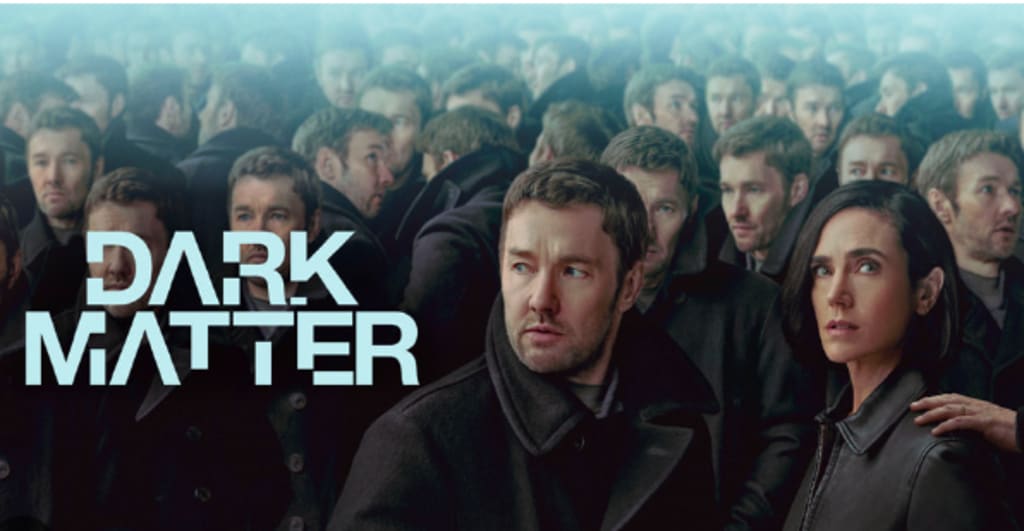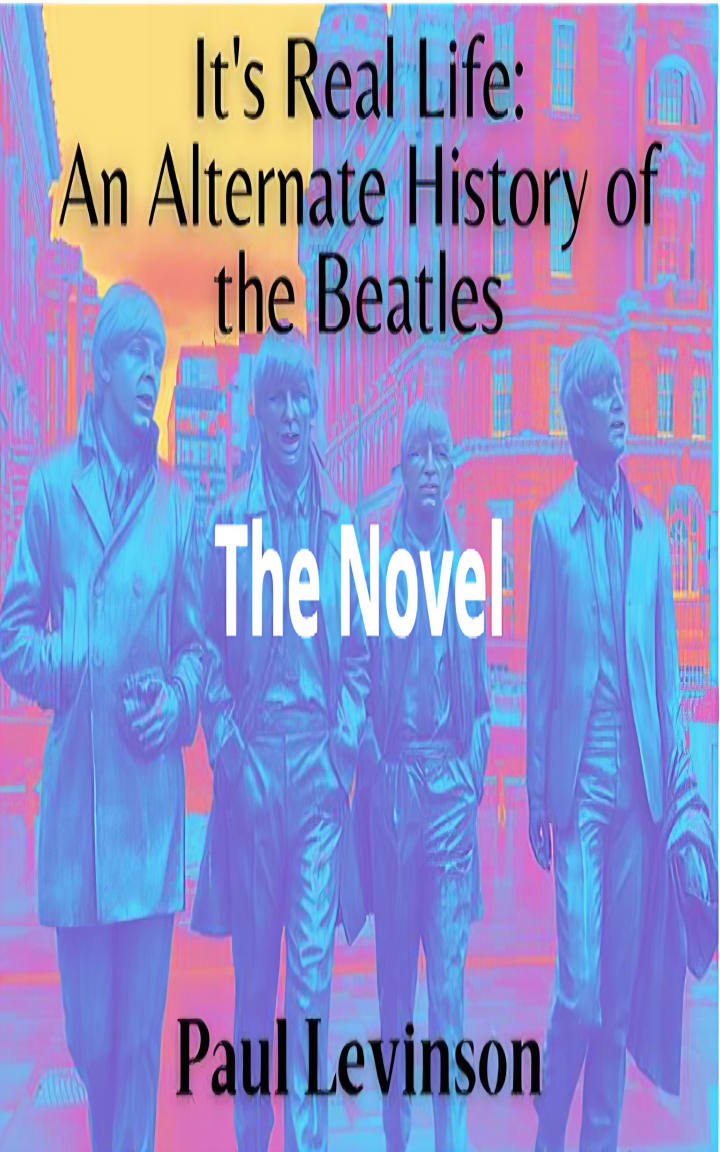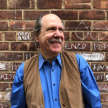Review of 'Dark Matter' 1.1-1.4
Break-Neck Action with Philosophic Depth

Dark Matter, the first two episodes of which debuted on Apple TV+ two week ago, is the third alternate reality narrative I've seen on the screen in the past month (see my reviews of Quantum Suicide, a film created by Gerrit Van Woudenberg which should be streaming on some major place by the Fall, and Constellation, another series on Apple TV+). All three bounce off the at-once famous and infamous Schrödinger's cat. Quantum Suicide has the feel of Primer and the work-at-home scientist. Dark Matter has a similar feel. And I'm beginning to think I don't want to think about these matters too hard, because the more I think about them, the more I think it's possible that I could be in an alternate reality myself, right now. But, hey, I'm so dedicated to doing this review, I think I'll risk it, anyway.
[Some spoilers ahead ... ]
One thing that makes Dark Matter, adapted by Blake Crouch from his novel of the same name published in 2015 (which I haven't read), different from the many other alternate realities that I've encountered on pages and screens, is that the two versions of the lead character Jason, once the story gets going, share the same knowledge of themselves and the alternate worlds they inhabit, up to a point. Or, to be more precise, the two versions of Jason have switched realities -- for some reason we do not really know until the end of the fourth episode -- and each quickly learns about their new reality, while retaining knowledge of their original reality before the time that their original reality split in two.
We also soon understand that the fork in this particular double reality happened 15 years earlier, when Jason had to make a decision about how he felt about his girlfriend Daniela's pregnancy. Our story begins in the present, with Jason and Daniela happily married, with Charlie their 15-year-old son. Before too long, Jason is kidnapped and ends up in an alternate reality in which Jason didn't want to be a father, Daniela had an abortion, and they're living separate lives. As the two episodes unfold, with an appealing mix of break-neck action and philosophical contemplation, we find the Jasons beginning to struggle with the question: In one reality, he's a happily married father, but he and Daniela have lackluster careers. In the other reality, Jason is a pathbreaking, enormously successful physicist and Daniela a famous artist, but neither has much of a personal life. Which life will/would Jason choose? (Which would you?) Assuming Jason has the power to now make such a choice.
***
Dark Matter 1.2 ends with the shocking murder of Daniela 2 in Jason 1's reality -- that is, not the Jason who actually built the full-size superimposition box/room that makes shifts into alternate realities possible -- and this in effect is an announcement that this story, or at least some of the characters in it, really mean business. Their motives are still not clear by the end of the third episode, but Dawn losing a few of her fingers as she tries to stop Jason 1 and Amanda after firing a gun at them confirms that this narrative means business indeed.
The loss of the fingers also serves another important purpose. We're told that four characters in World 2 entered the box/room, and, who knows, there could be more. We'll at least now know immediately that if Dawn suddenly shows up in World 1 with missing fingers, she's actually Dawn 2.
But lest you think that Dark Matter is all quantum mechanics and gore, there's also some nicer clever touches in 1.3 My favorite is the guess who's coming to dinner party in World 1, in which Jason 2 struggles to know who everyone is and what they do -- using an iPhone to help (of course it's an iPhone, the series is on Apple TV+) -- and Ryan 1 tells Jason 2 that he's looking good (which he should -- award-winning scientists probably do live and look at least a little better than their harried professor counterparts).
***
Episode 1.4 of Dark Matter up on Apple TV+ this week was highly informative, as Jason 1 and Amanda make their way through "The Corridor" (the title of this episode) and therein partake of the doors to the multiverse.
And I have to say that my favorite spoken line in this episode is when Jason tells Amanda that the entire corridor with its doors doesn't really exist --they are rather the result of their human minds struggling to make a little sense of a reality that the human mind cannot comprehend. The only thing missing in this astute observation was that the true conduit(s) to the universes Jason and Amanda were accessing were the thing-in-itself, which Immanuel Kant realized that the human intellect could never comprehend.
Kant made that observation in the 1700s (in our universe). Jason 1 also draws upon a fundamental principle of quantum mechanics, which of course brings us to the 1900s, and underlies all of Dark Matter. That principle is that the mere observation of a subatomic particle can change it. Jason explains that he and Amanda can get to the alternate reality they seek by merely clearly thinking about that reality. This QM on the macro-level has been a staple of lots of science fiction, and Dark Matter is parlaying it very effectively.
Indeed, Jason goes on to explain that his kidnapping that launched this narrative was the result of Jason 2 figuring out in which alternate universe Jason 1 was residing, because Jason 2 wanted to give Jason 1 some of the pleasure of having Jacob 2's accomplishments as a world-famous scientist -- actually, not figuring it out, but envisioning it in some intense way, and thereby finding and identifying the door into that reality. This answers the question that arose in the second episode about why the kidnapping took place. Also, since the multiverse consists of all possible realities, which in practice is an infinite number of places, this QM way of locating the place that you want to visit is a good thing to have on hand.
And Dark Matter, as of its fourth episode, is a very good thing. It's rare to find philosophy woven so well into a thriller, inside a corridor with so many tempting and dangerous doors.

About the Creator
Paul Levinson
Novels The Silk Code, The Plot To Save Socrates, It's Real Life: An Alternate History of The Beatles; LPs Twice Upon A Rhyme & Welcome Up; nonfiction The Soft Edge & Digital McLuhan, translated into 15 languages. Prof, Fordham Univ.
Enjoyed the story? Support the Creator.
Subscribe for free to receive all their stories in your feed. You could also pledge your support or give them a one-off tip, letting them know you appreciate their work.
Reader insights
Outstanding
Excellent work. Looking forward to reading more!
Top insights
Compelling and original writing
Creative use of language & vocab
Easy to read and follow
Well-structured & engaging content
Excellent storytelling
Original narrative & well developed characters
Heartfelt and relatable
The story invoked strong personal emotions
Masterful proofreading
Zero grammar & spelling mistakes
On-point and relevant
Writing reflected the title & theme






Comments (4)
I really must get Apple TV+. This sounds like a great show same with Constellation (and Quantum Suicide). Excellent writing as always Paul.
The mention of philosophical concepts and the impact of quantum mechanics on the storyline underscores the show's depth and intellectual appeal.
Good job on the review!
I will watch this series. I am so 'into alternate realities . I actually have had personal experiences involving alternate realities on the level of what would be quantam physics I suppose . That's another story .